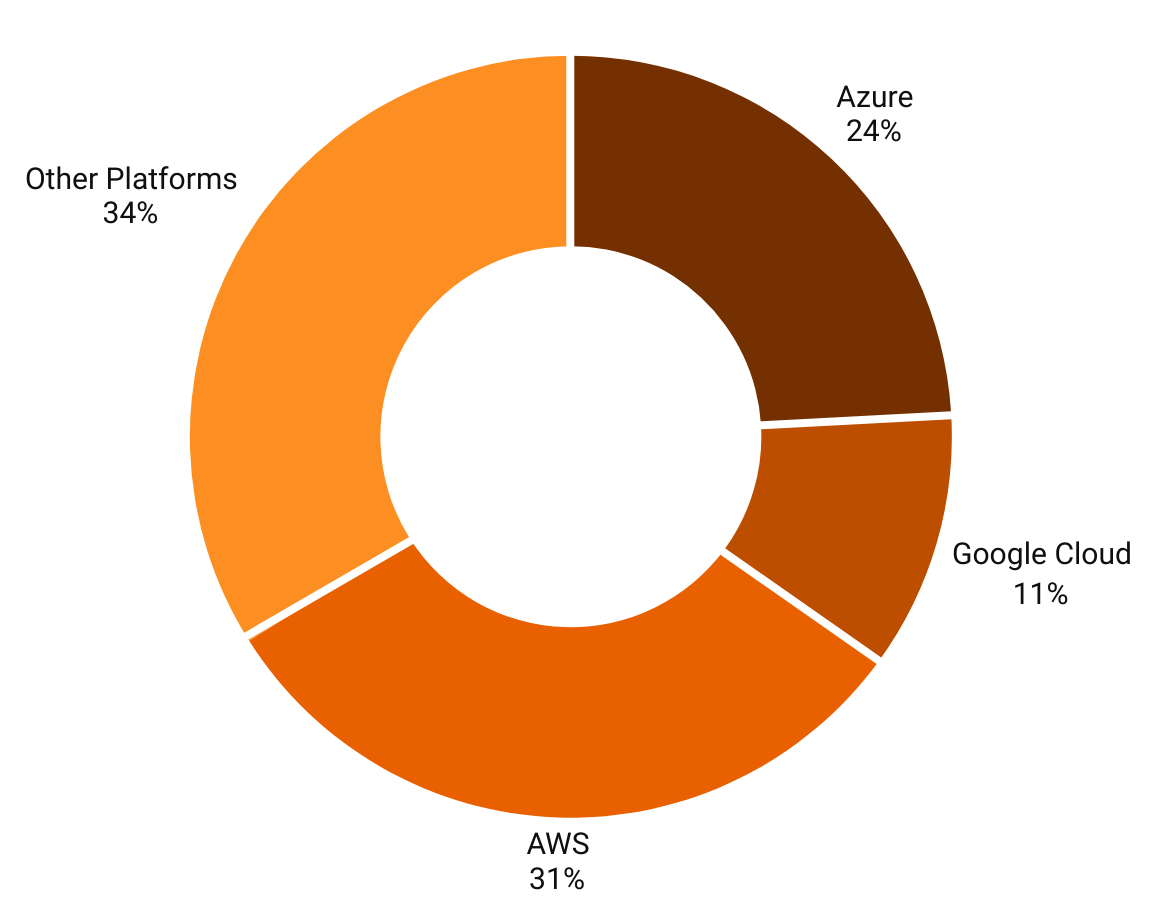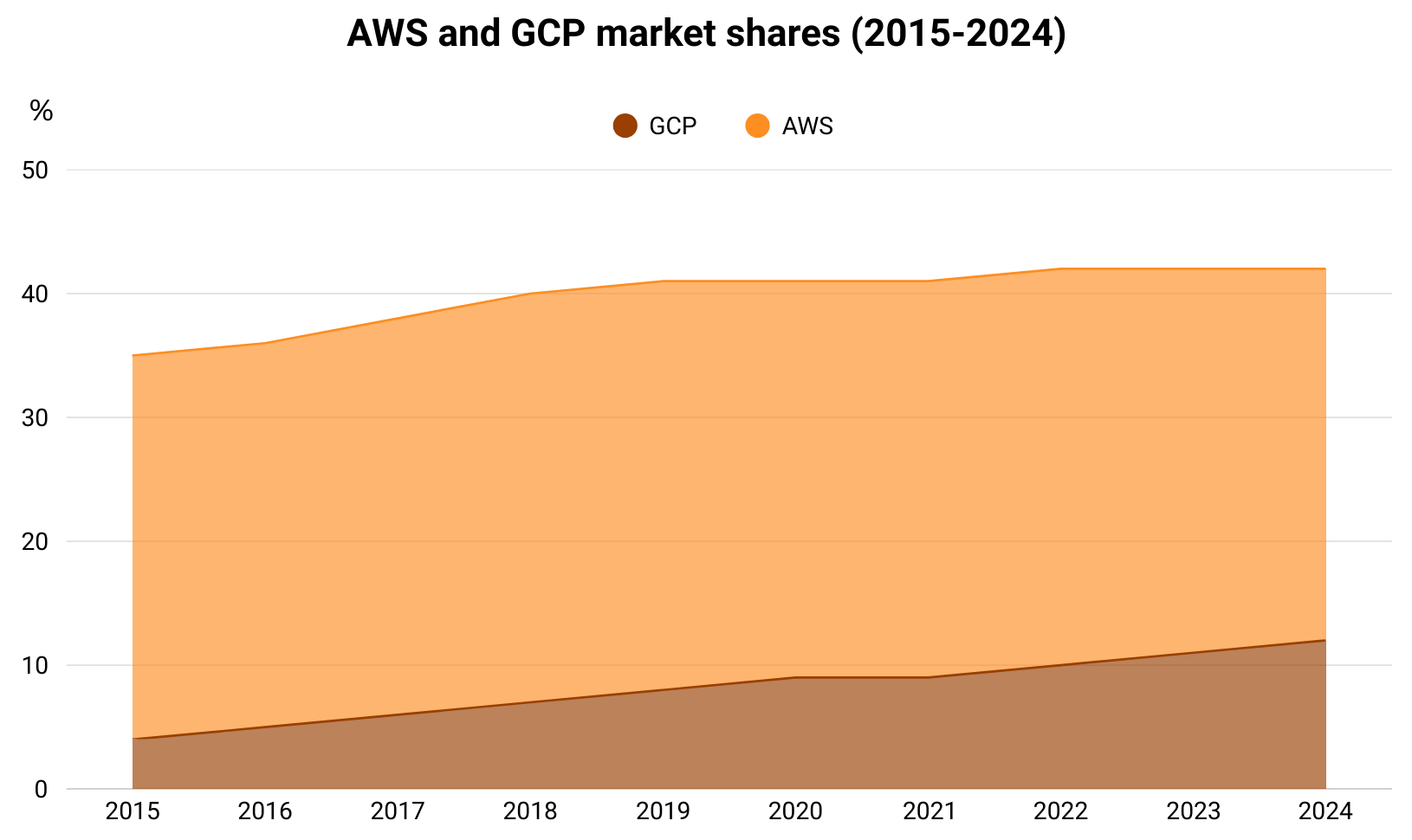Google Cloud vs. AWS


Today, more and more businesses are moving to the cloud. But which platform is right: Google Cloud Platform (GCP) or Amazon Web Services (AWS)? And what to follow when choosing? Both platforms are industry leaders, offering a wide range of cloud solutions for storage, computing, machine learning, and more. In this article, we’ll take a detailed look at the features of GCP vs AWS, compare them across key parameters, and explain how our team can support integration and maintenance of these solutions. Azure, AWS and Google Cloud platform can be called Big Players of the niche. PNN Soft has experience in implementing projects using tools and providing migration services to each of these platforms. We offer to compare and learn in depth about what makes them market leaders to help businesses decide on their choice.

Amazon Web Services is Amazon’s cloud platform, operating since 2006 and holding a leading position in the market. Amazon unveiled its first flagship solution first, launching two S3 and EC2 products in the same year. Currently, AWS offers 200 cloud services. There is no need to know them all, but we will briefly introduce the key ones and reveal their purpose.
According to the mentioned characteristics, we can draw reasons to choose Amazon Web Service In comparison with Google cloud platform vs AWS, the last one is a pioneer in the cloud market. AWS offers the extensive catalog of services with highly specialized offerings for niche use cases. Over the years, Amazon Web Service has enjoyed a steady presence in corporate environments. Therefore, companies with a large load provide overload with AWS cloud solutions. This platform is widely used by regulated industries that require a certain number of certificates of conformity. Also, it provides more third-party integrations and strong tool for IoT and Edge Computing.
Google Cloud Platform launched in 2008 and quickly became the second most popular cloud provider. However, now it takes the third position. If we take a closer look at Google’s path in the cloud platform niche, then 2008 was a beta launch, and 2011 became a full-time market participant. Google expanded its cloud services and released products – BigQuery, Cloud Storage, Compute Engine – that could confidently compete with AWS. So in 2011, Google Cloud Platform became a full-fledged infrastructure. It offers integration with Google services and deep expertise in data processing. In the ongoing comparison of Google cloud platform vs AWS, GCP distinguishes itself with strong analytics capabilities, a developer-friendly environment, and deep AI/ML integrations.
According to the mentioned characteristics, we can draw reasons to choose GCP. Google Cloud Platform well known for global and superior network performance and reliability. GCP is a master in Data Analytics tasks. BigQuery provides a powerful, user-friendly analytics platform with seamless scaling and strong ML integration. If AWS pays special attention to IoT. Google cloud Platform in known for its Machine Learning capabilities. Businesses that deal with data analytics and machine learning of docs prefer GCP. Due to the flexible pricing policy, this platform prevails among startups and smaller organizations. Google’s deep integration with Kubernetes also affects the choices organizations make.

Both cloud service providers offer comprehensive offerings, although these may differ in implementation details, pricing models, and specific features. There are categories in which one of the AWS or GCP platforms does not offer services, but they have a different approach to the solution.
| Category | GCP | AWS | Comparative Notes |
|---|---|---|---|
| Virtual Machines (IaaS) | Compute Engine | EC2 | Both comprehensive; AWS offers more instance types |
| Containers/Orchestration | Google Kubernetes Engine (GKE), Cloud Run | ECS, EKS, Fargate | GCP has advantage in Kubernetes (created by Google) |
| Serverless Computing | Cloud Functions | Lambda | AWS has broader serverless ecosystem and integration |
| Web App Platform (PaaS) | App Engine | Elastic Beanstalk | Comparable offerings |
| Object Storage | Cloud Storage | S3 | Both robust; S3 has broader ecosystem |
| Block Storage | Persistent Disk | EBS | Comparable offerings |
| File Storage | Filestore | EFS, FSx | AWS offers more file storage options |
| Relational Databases | Cloud SQL, Cloud Spanner | RDS, Aurora | Both comprehensive; AWS has more engine options |
| Distributed SQL Databases | Cloud Spanner | Aurora | Spanner has stronger global consistency guarantees |
| NoSQL Databases | Firestore, Bigtable | DynamoDB, DocumentDB | Comparable with different tradeoffs |
| Analytics Databases | BigQuery | Redshift | BigQuery is more user-friendly with stronger ML integration |
| Big Data Analysis | BigQuery, Dataproc | EMR, Athena | Comparable capabilities |
| Hadoop/Spark Clusters | Dataproc | EMR | Comparable offerings |
| Data Stream & Batch Processing | Dataflow, Pub/Sub | Kinesis, Glue | Comparable capabilities |
| AI/ML Platforms | Vertex AI | SageMaker | GCP benefits from Google’s AI research |
| AI APIs/Computer Vision | Vision AI, Speech-to-Text, etc. | Rekognition, Transcribe, etc. | GCP often has more advanced AI capabilities |
| CDN | Cloud CDN | CloudFront | AWS CloudFront has more edge locations |
| Load Balancing | Cloud Load Balancing | Elastic Load Balancing | Comparable offerings |
| Isolated Networks (VPC) | VPC | VPC | Comparable offerings |
| Data Visualization/BI | Looker, Looker Studio | QuickSight | Looker offers more advanced functionality |
| Access Control | IAM | IAM | Comparable offerings |
| Encryption | Cloud KMS | KMS | Comparable offerings |
| Key Management | Cloud Key Management | KMS, CloudHSM | AWS has slight edge with CloudHSM options |
| Monitoring & Logging | Cloud Monitoring, Cloud Logging | CloudWatch | Comparable offerings |
| IoT Services | Cloud IoT (discontinued) | AWS IoT Core, Greengrass | AWS has superior IoT ecosystem |
| Hybrid Cloud | Anthos | Outposts, ECS Anywhere | AWS had earlier market entry |
| Serverless Ecosystem | Limited to Cloud Functions, Cloud Run | Extensive (Lambda, Step Functions, EventBridge) | AWS has more mature serverless ecosystem |
| Service Breadth | More focused service catalog | Larger, more granular service catalog | AWS offers more specialized services |
When comparing this cloud platform, consider the nature of your projects, architectural preferences, and security requirements.
l
| Parameter | AWS | GCP |
|---|---|---|
| Maturity Level | More mature, extensive ecosystem | Newer but rapidly evolving |
| Containerization | Support via ECS and EKS | Industry standard with GKE |
| Data Processing | Redshift, Glue, QuickSight | BigQuery, Dataflow, Bigtable |
| AI and ML | SageMaker, Rekognition | Vertex AI, AutoML, Vision AI |
| Ease of Use | Powerful but complex | More intuitive interface |
| Pricing | Flexible model | Transparent and predictable |
| Product Integration | Amazon ecosystem | Deep integration with Google Workspace, Android |
The advantage of Google cloud hosting vs AWS lies in high network speed and integration with Google products. Meanwhile, AWS offers a wider range of pre-built tools and solutions.
Both AWS, Google cloud platforms prioritize security by offering comprehensive data protection, access control, and compliance tools. Each platform uses its own implementation of access management: AWS IAM (Identity and Access Management) and GCP IAM allow users to create granular access policies based on roles, attributes, and context. This provides control over the actions of users, services, and external applications. The principle of least privilege can be implemented, which significantly reduces the risk of insider threats.
Encryption of data at all stages — during transmission, at rest, and during processing — is standard. Both providers offer options for managing your own encryption keys (BYOK) and integration with hardware security modules (HSM). Security certifications cover a wide range of standards including ISO 27001, SOC 1/2/3, PCI DSS, HIPAA, FedRAMP, GDPR and others, enabling GCP and AWS to be used in highly regulated industries such as finance, healthcare, and the public sector.
In the context of AWS vs Google, both clouds also provide advanced monitoring and incident response tools: AWS CloudTrail, AWS GuardDuty, Google Cloud Audit Logs, and Cloud Security Command Centre. These services enable real-time activity monitoring, automated threat response, and security auditing.
The pricing model of AWS and Google Cloud Platform is based on the pay-as-you-go principle, i.e., payment is made for actual resource consumption. This makes cloud solutions flexible and scalable, especially for companies with variable workloads. However, the platforms differ in their approaches to cost optimisation.
GCP offers automatic usage discounts that are applied without the need for manual configuration: the longer you use resources during the month, the lower the final price. This is especially beneficial for stable workloads that don’t need to reserve resources in advance.
In turn, AWS offers Reserved Instances, which allow you to ‘reserve’ compute resources in advance for one to three years at a reduced price. This approach can provide significant savings, but requires planning and a time commitment.
For new users, Google Cloud Platform (GCP) provides a generous 90-day free trial with $300 in credits, which can be used across nearly all cloud services.
When comparing GCP vs AWS in terms of support ecosystems, AWS stands out with its extensive partner network, robust enterprise-level support plans, and global availability zones. It is often the preferred choice for large-scale, mission-critical systems where uptime, compliance, and scalability are top priorities. However, GCP is rapidly catching up, especially in developer-friendly tooling, API clarity, and innovation speed.
Moreover, GCP’s open-source culture (e.g., Kubernetes, TensorFlow, and Istio originated at Google) makes it especially appealing to teams focused on modern software development practices. For organizations that value fast iteration, DevOps, and data-driven decision-making, GCP’s ecosystem provides a flexible, forward-looking environment.
Overall, while AWS vs Google still shows AWS as the leader in enterprise maturity, breadth of support, and long-term reliability, GCP appeals to agile teams and startups seeking clarity, modern UI/UX, and cutting-edge tools integrated with Google’s broader technology stack.
Comparing AWS vs Google compute, both platforms offer flexible virtual machines. AWS has a broader range of instance types, while GCP provides a better price-performance ratio in most scenarios. Google excels in analytics and innovation, while AWS leads in stability and scalability. AWS remains the leader in popularity and pre-built solutions, but GCP is gaining ground, especially among startups, mobile developers, and data-driven companies. In the battle of Amazon Web Services vs Google cloud, the choice depends on project goals and company priorities. For maximum coverage and ready-made tools—go with AWS. For flexibility, open standards, and AI focus—go with GCP.
Our team provides professional services for deploying, configuring, and maintaining cloud solutions based onAWS and Google Cloud Platform. We can help you:
Whether you’re choosing between Amazon AWS vs Google cloud or just exploring options—we’ll help you find the optimal solution. Ready to get started with the cloud? Contact us—we’ll develop the best strategy for your business growth based on your goals and budget.